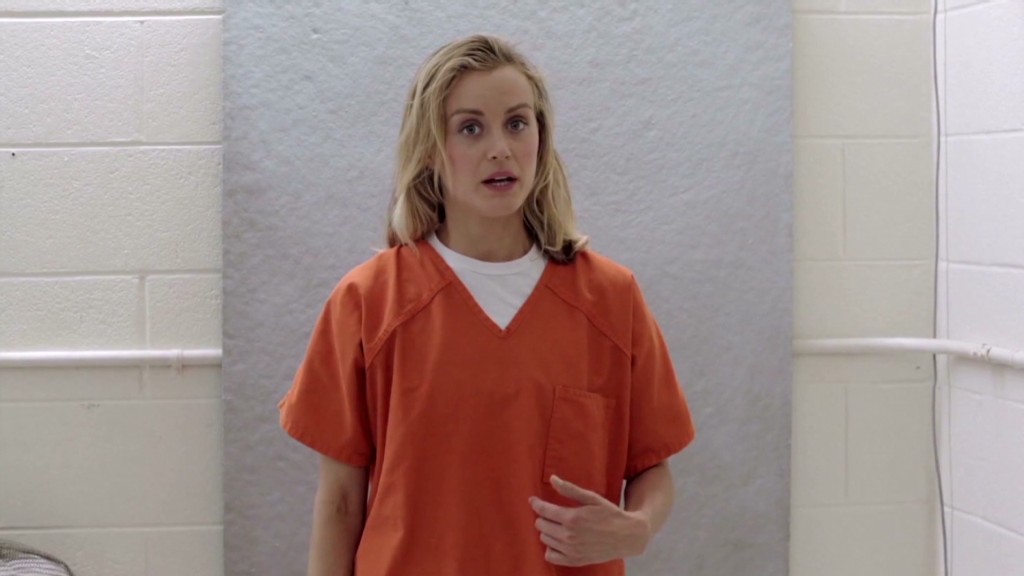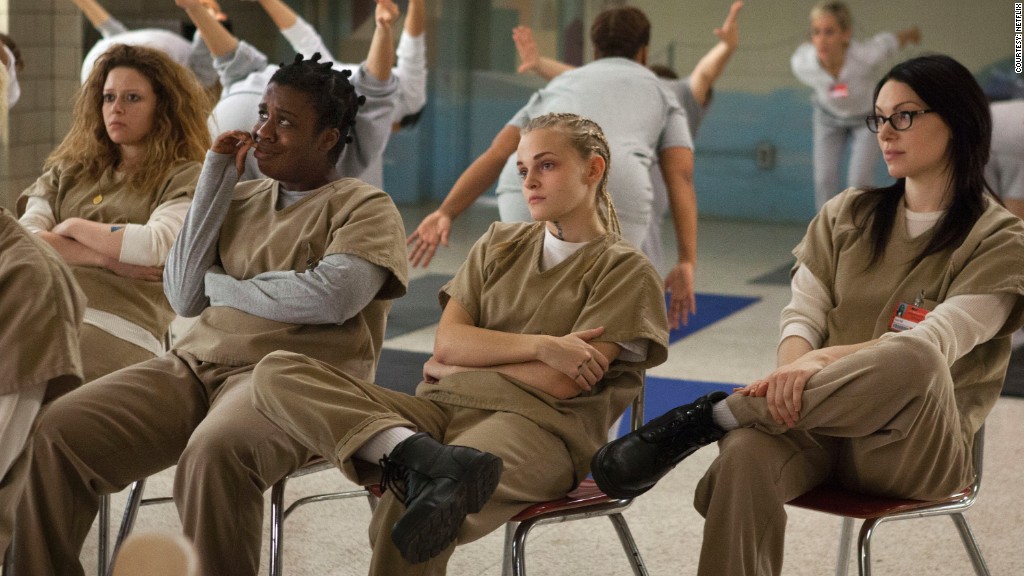
Ted Sarandos, chief content officer at Netflix, doesn't come across as an impatient fellow. But ask him which conventions of television and film he'd most like to change and he shoots back: "The waiting."
He's wasting no time trying to change that. Netflix (NFLX) released the second season of its biggest show, "Orange is the New Black," all at once Friday, as is the streaming service's custom for its original shows.
In Sarandos' view, there are still too many artificial delays baked into the traditional television business. He described the attitude this way: "We're gonna string the audience along for several weeks so that we can sell ads and promote our shows."
"Every kind of flavor of that should go out the window, as we have conditioned the universe to expect instant gratification by the Internet," he said.
Sarandos is using Netflix's $3 billion content budget to nudge -- or shove -- Hollywood in that on-demand direction.
Related: Netflix-Verizon feud flares up again
In an interview at Netflix's headquarters, Sarandos said he doubted that "Orange," about inmates at a women's prison in upstate New York, would have made it onto traditional television in the form it's in today.
He was "cautiously optimistic" when the inaugural seasons of "House" and "Orange" were released last year, but said he understood why many others were skeptical.
"It was a likely bet that an Internet DVD-by-mail company who's been streaming for a few years was not going to launch TV shows that mattered right off the bat," he said.
"I would have said it would have taken several years to get to the level of original programming that we've achieved in our first year, both in terms of size of the audience; to the critical reception of the shows; to the importance that they've played in the culture."
Just last week, one of the stars of "Orange," Laverne Cox, appeared on the cover of Time, illustrating what the magazine called "The Transgender Tipping Point." Sarandos said he was proud of that, and cited it as a sign that "the show is in the national dialogue." (Watch his comments here.)
Ratings would be another sign, but Netflix has steadfastly declined to share specific viewership data for its shows, arguing it has no reason to do so because it doesn't sell advertising.
Nielsen ratings are for ad sales, Sarandos said, "so there's no real reason for us to engage Nielsen and report our ratings to other folks."
He did drop a couple of hints about the company's two biggest original hits, though.
Related: Netflix stock: Buy or sell?
"They're both very successful shows, but 'Orange is the New Black' is the larger one," Sarandos said.
Asked whether "Orange" is, for instance, twice as popular as "House," he said: "No, no, definitely not."
The audiences for the two series are distinct, he said, with some overlap: "'House of Cards' would skew older and more male. 'Orange' would skew younger and more female."
Have more than half of Netflix's subscribers watched "Orange?" He repeated the question, then said, "It's got a very big fan base."
Related: Netflix moves to conquer Europe
Ads and news stories about February's second season of "House of Cards" caused many subscribers to prepare by binge-watching the first season, giving the series what Sarandos called its "biggest viewing day" on the eve of season two's premiere.
"We're seeing it this week with the run-up of 'Orange' as well," he said.
While press attention around Netflix's new shows sometimes lingers on the hardcore fans who "absolutely devour the show in the first 13 hours," that attention might be misplaced, Sarandos suggested. "The vast majority of the people, they will watch at their own pace, whenever they want, at whatever pace they want."
The curiosity around Netflix's original series is natural, but it's worth keeping in mind that they make up only a tiny portion of total Netflix viewing.
"About 70 percent of the total watching on Netflix is television shows in their previous season models," Sarandos said. "Our original programming is growing. And movies, they still hold onto about 30 percent of the business."

When Sarandos spoke about creating shows for "the on-demand generation," he grew animated; to him, it's about giving consumers more control over what they watch.
"I've never heard anybody say, 'You know what would be great? If I put in my question in Google and waited a week for the answer to come back,'" he quipped. "I don't think that the sexiness, the allure of anticipation, is anywhere near as good as the satisfaction of watching."
Watch more of Stelter's interview with Ted Sarandos on "Reliable Sources" this Sunday at 11 a.m. Eastern time.


